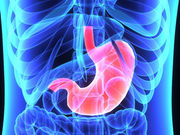Tag: Weight Loss Surgery and Bariatric
Pre-Op Weight Loss Improves Outcomes of Bariatric Surgery
Pre-op excess weight loss tied to significantly greater rate of post-op excess weight loss over one year
Increased Risk of Complications With Bariatric Surgery
Lower risks of obesity-related comorbidities but increased risk for complications versus medical tx
Lap Sleeve Gastrectomy, RYGB Equally Effective in Weight Loss
Studies show no significant difference in BMI loss at five years between these laparoscopic procedures
Low Rates of Major Complications After Bariatric Surgery
<30-day rates for anastomotic leak, MI, PE, and following mortality generally low
β-Cell Sensitivity to Glucose Impaired After Gastric Bypass
Individuals with prior Roux-en-Y gastric bypass have reduced β-cell glucose sensitivity
Different Weight Loss Patterns Observed Following Bariatric Sx
Mean weight loss of 38.2 kg (28.4 percent), 18.8 kg (14.9 percent) seven years after RYGB, LAGB
CPAP May Be Superior to Gastric Banding for Severe Sleep Apnea
At 9 months, apnea-hypopnea index is significantly lower with CPAP than with laparoscopic banding
GLP-1 May Mediate Effects of Gastric Bypass on CNS Activation
After Roux-en-Y, CNS activation reduced in response to food cues, GLP-1 levels significantly elevated
High Rate of Anemia Seen After Weight-Loss Surgery
Anemia much more common among patients who did not have close follow-up with weight-loss surgeon
Long-Term Weight Loss, T2DM Remission for Roux-en-Y Surgery
Twelve-year follow-up shows durability of weight loss and remission and prevention of type 2 diabetes














